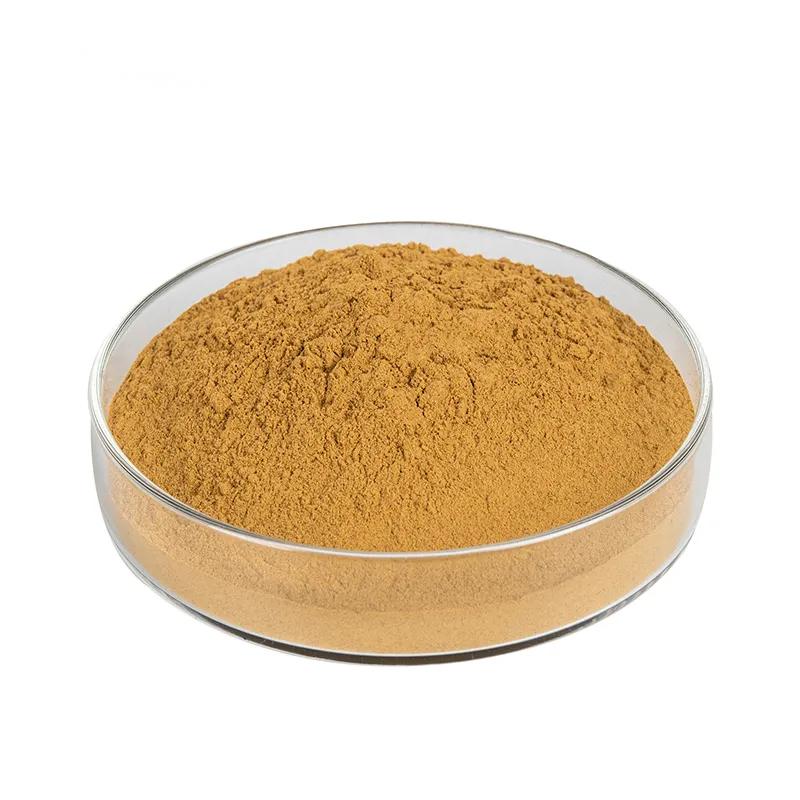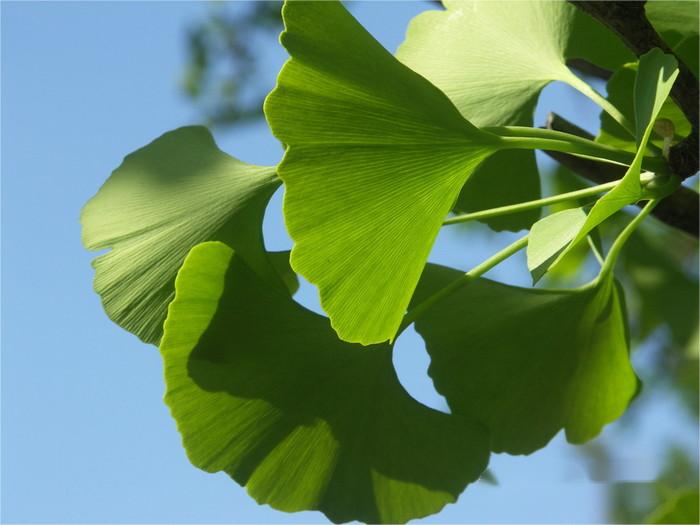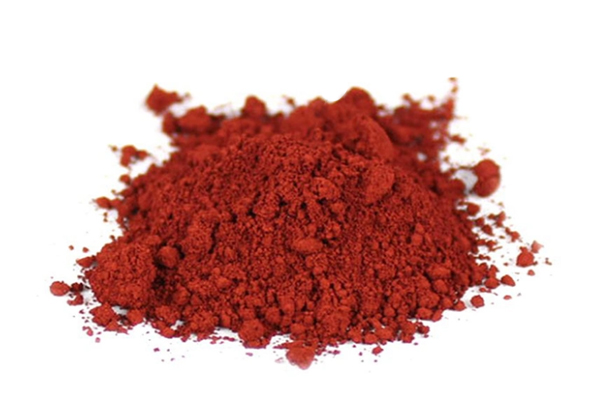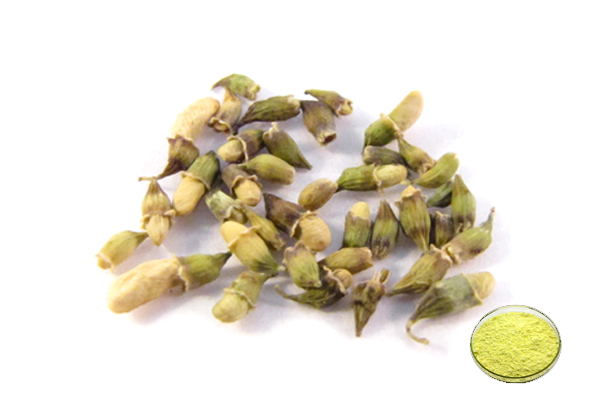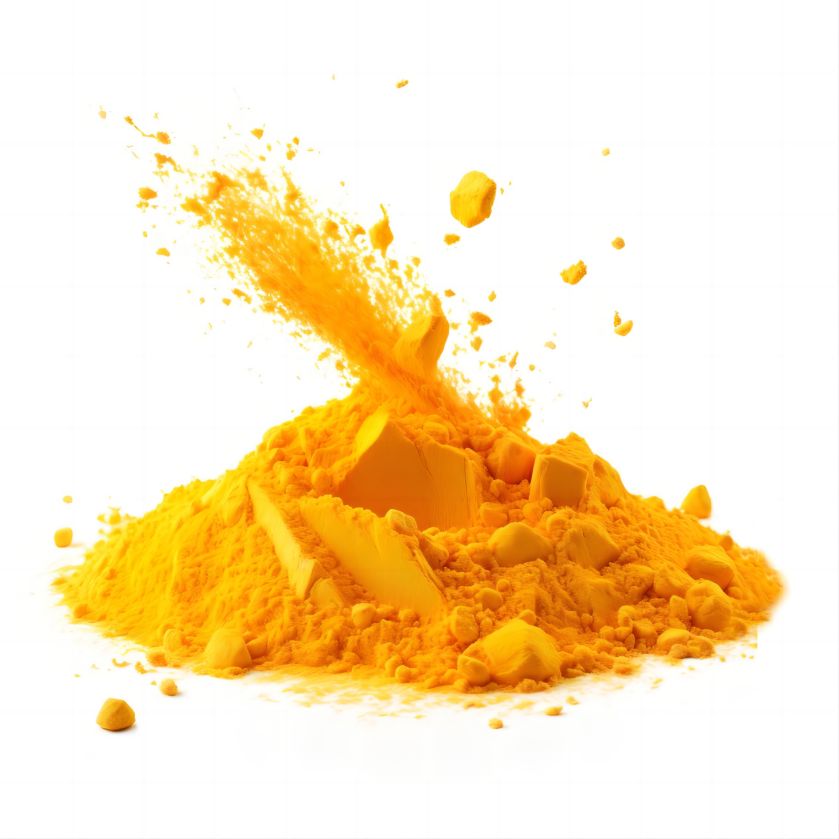Ginkgo Biloba Leaf Extract Powder
Product Name:Ginkgo Biloba Leaf Extract Powder
Assay:Total Flavone Glycosides:≥24.00%
Testing Method:HPLC
Appearance:Light Yellow-Brown or Light Brown Powder
Pesticide Residue:Comply with (EC) No 396/2005 Standard
- Description
- Data Sheet
- Certificate
-
What is Ginkgo Biloba Leaf Extract Powder?
Ginkgo biloba leaf extract powder is a light yellow-brown flowable powder extracted from the dried leaves of Ginkgo biloba L., a plant of the Ginkgoaceae family, using appropriate solvents, the active ingredient. Its main components are ginkgo total flavonoids, ginkgolides, and other substances, with are vasodilators, that protect the endothelial tissue of blood vessels, regulation of blood lipids, protection of low-density lipoproteins, inhibition of PAF (platelet-activating factor), inhibition of thrombosis, scavenging of free radicals, etc. On October 27, 2017, the World Health Organization, the International Agency for Research on Cancer, published the preliminary collation of the list of carcinogenic references, ginkgo biloba leaf extract is in the list of group 2B carcinogens.
Ginkgo biloba leaf extract powder supplied by Green Spring Technology is strictly enforced by EU standards, and the whole production process is controlled and traceable from raw materials to finished products. The testing of various pollutants is carried out in accordance with the highest EU standards, and we can provide third-party authoritative test reports. This Ginkgo biloba extract powder has high content, good water solubility, and stable quality, and has been widely used in health care products, food, medicine, and other fields.
Specification:
Product Name
Ginkgo Biloba Leaf Extract Powder
Latin Name
Ginkgo Biloba L.
CAS No.
90045-36-6
Source
Dry Leaves of Ginkgo Biloba L., A Plant of the Ginkgo Family
Active Ingredients
Flavone Glycosides
Assay
Total Flavone Glycosides:≥24.00%
Testing Method
HPLC
Appearance
Light Yellow-Brown or Light Brown Powder
Pesticide Residue
Comply with (EC) No 396/2005 Standard
Regulation:
It conforms to EU regulations.
Looking for a Quotation?Benefits:
Scavenging Free Radicals
Ginkgo biloba leaf extract can directly scavenge lipid radicals, lipid peroxidation radicals alkyl radicals, etc., and terminate the chain reaction chain of free radicals. It is also involved in regulating and enhancing the activity of antioxidant enzymes such as peroxide dismutase, glutathione peroxidase, etc. The antioxidant effect of flavonoids in ginkgo biloba extract even exceeds that of vitamins, and it has anti-free radical attack properties in vitro.
It has been demonstrated that the addition of different concentrations of ginkgo biloba leaf extract to different reaction systems can convert free radical products such as OH to non-free radical products. Ginkgo biloba extract scavenges in a manner similar to the antiradical effect of uric acid, and it also inhibits the free radicals produced by warming doxorubicin with liver microsomes P-450 and reduces the production of the lipid peroxide malondialdehyde (MDA). Since Ginkgo biloba extract is characterized by 2 components, hydrophilic and lipophilic, its therapeutic effect is superior to that of any single component.
Cardioprotection
Ginkgo biloba leaf extract has vasodilatory and cardioprotective effects and has significant therapeutic effects on cardiac ischaemia, allergic disorders, and infectious shock. In rabbit heart ischemia-reperfusion experiments, intracoronary injection of Ginkgo biloba extract can significantly inhibit the increase of MDA in plasma and myocardial tissue. The degree of damage to myocardial cells observed by electron microscopy was also significantly less than that of the control group. It also protected plasma tissue-type plasminogen activator (tPA) at a higher level and reduced PAI-1, an effect that may be beneficial by regulating fibrinolytic activity.
Protection Against Cerebral Ischaemia
The protective effect of Ginkgo biloba extract on cerebral ischaemia and cerebral oedema was observed in both the carotid artery ligation model and the rat cerebral oedema model of cerebral ischaemia and cerebral oedema. By maintaining the normal respiration of intracellular mitochondria, Ginkgo biloba prevented the disturbance of ion transport in the cell membrane caused by cerebral ischemia and prevented intracellular Ca2+ overload and brain cell damage. In cerebral infarction test, Ginkgo biloba extract can reduce the scope of focal cerebral infarction and improve the neurobehavioural disorders caused by ischemia. At the same time, Ginkgo biloba leaf extracts and Bilobalide had the effects of anti-ischemia-induced neuronal cell death and reduced mitochondrial gene expression.
Protection of Neurons
Flavonoids have a free radical scavenging effect and attenuate mitochondria-mediated apoptosis due to increased free radicals. Inhibit calcium ion in-flow, reduce amino acid excitability, and protect nerve cells from damage. Promotes ATP synthesis and reduces the production of inflammatory factors, thereby reducing neuronal effects. The active ingredients flavonoids in Ginkgo biloba extract inhibit the expression of mutated genes after ischaemia and reduce apoptosis.
Antithrombotic
Platelet-activating factor-PAF is the strongest aggregation factor and induces thrombosis. Ginkgolides, an extract of Ginkgo biloba, have been shown to be specific inhibitors of PAF and effective against thrombus formation. Against the phenomena of vasoconstriction and reduced blood flow after ischaemia-reperfusion. Ginkgo biloba leaf extract significantly reduces thrombosis caused by reperfusion and changes the rheology of blood.
Anti-inflammatory
Animal experiments have shown that low, medium, and high doses of Ginkgo biloba leaf extract injection can significantly reduce the concentration of serum ultrasensitive C-reactive protein (hs-CRP) in rats, suggesting that it can exert a certain inflammatory inhibitory effect. In addition, Ginkgo biloba extract injection can inhibit the stimulation of glial cells by lipopolysaccharide to a certain extent, reduce the production of tumour necrosis factor and interleukin-1b, and lower the level of inflammatory factor activity.
Applications:
In Pharmaceutical:
The modern application research and development of Ginkgo biloba began in Germany, the ginkgo biloba preparation "Tibonin" was developed in 1965 by the largest German botanical medicine enterprise, Dr. Weimar Schöppe Pharmaceuticals, and for the first time, a simple extract of Ginkgo biloba was registered, and a patent was filed for EGb761 in 1972, which was used for the treatment and prevention of Alzheimer's disease (dementia), terminal vascular blockage and other diseases. In 2001, the World Health Organisation (WHO) declared EGb761 to be the first choice for the treatment and prevention of cardiovascular and cerebrovascular diseases, making ginkgo biloba extract a globally-recognized killer of cardiovascular and cerebrovascular diseases.
For Health Products:
Ginkgo biloba extract can enhance human immunity, improve sleep quality, relieve fatigue, and so on. In addition, it can prevent and treat Alzheimer's disease, eye diseases, and other diseases. Ginkgo biloba extract powder has been widely used in health supplements, nutritional products, and other products.
For Feed Product:
In the field of veterinary medicine and feed, ginkgo biloba preparation is a kind of all-natural green feed additive, which is also widely used in livestock disease control. Ginkgo biloba extract has an immunomodulatory function, which can improve the anti-oxidative stress ability of livestock, and livestock away from the inhibition of pathogenic microorganisms, prevention of tumors, and no toxic side effects. In addition, Ginkgo biloba extract powder can improve the growth performance of broiler chickens, promote growth, and improve the feed conversion rate.
-
Download
Ginkgo Biloba Extract Powder Bulk COA


 English
English French
French Spanish
Spanish Russian
Russian Korean
Korean Japanese
Japanese



